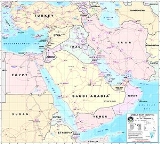What is the cultural significance of the middle east?
replied to: jkwilliams
Replied to: What is the cultural significance of the middle east?
THe Middle East was a important focal point of world affairs and contributed to the origin of three major world religions - Judaism, Islam and Christianity.
replied to: swartzy
Replied to: THe Middle East was a important focal point of world affairs...
It has many monuments like churches, temples, mosques and has had many now non existent ones like the Hanging Gardens of Babylon etc...
replied to: jkwilliams
Replied to: What is the cultural significance of the middle east?
The cultural significance has shifted and changed over time. Today's significances is clearly different from that of the 19th century, the Middle Age, Classical period, or even, Pre-history. To start at the beginning, as it were, it has been proved that basic state and city building as well as irrigation and standardized cultivation practices were refined within this region. River settlements were first reported to have existed here as people pushed ever outward from Africa-proper to the adjacent regions around it. So I suppose you could argue that the cultural significance at that time is without parallel as it gave life and form to what came to be Europe, Asia, and Africa. It is thought to be the birthplace of "civilization." The Classical era saw the first complex states rise. It laid claim to being home to the worlds largest empire of its time, the Persian Empire, which revolutionized medicines of its era and helped assist in the Hellenistic period as its culture ensnared Alexander of Macedonia. The Middle Ages (1200-1450C.E. we'll say) presented an incredible development of medicines, science, and state building in the area we might call the "Middle East." Through its externalized regions it passed culture and practice into Europe and operated as a "go-between" for the rest of Asia as a connection to Europe. The time of the 19th century is a mixed bag which can't fairly be reduced to a single culture or cultural development but I suppose it can be addressed that the region lost much of its cohesion and lapsed into smaller states as the Ottoman Empire collapsed under corruption and unrelenting competition from European states. Europe, too, sought to break up much of this region for expansionist reasons seeking colonial and territorial gains to protect interests in the Indian Ocean and the distant Pacific where trade was widely prized. Essentially, the term "Middle East" could be applied at this time as it is euro centric and assists in their justification of annexing or distorting territories within the region in question. In no way can we say there is a singular culture at this time. The Modern take on this region as far as culture can be addressed is that it plays host to some of the oldest languages and historic sites in the world. It is an ever changing tapestry of state and religion. This has been more an incredibly minimized historical overview of cultural suggestion in the region. As an aside, "Middle East" is not actually a region of the world so much as a designation designed to disinherit the populations located within from their right of region existence as Asia stretches from the Pacific all the way to the East coast of the Aegean.

